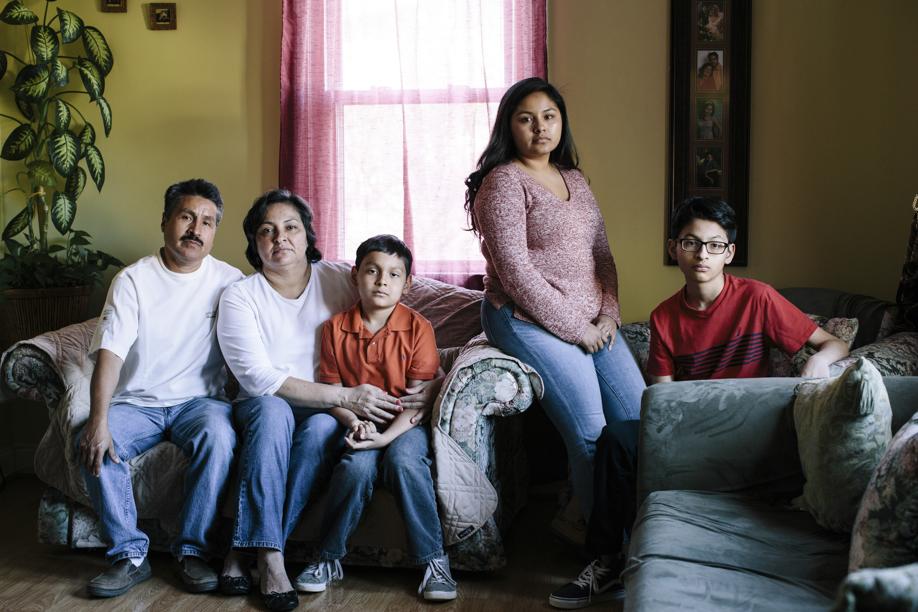
FAIRFAX, Va. — Jerry Pinto, an immigrant from Bolivia, has visions of opening a spacious carpentry workshop in this suburban city, with his name in bold letters over the door.
“I want a place where I can be visible,’’ he says wistfully. But for now he knows he has to lie low because he is in the country illegally. He runs his carpentry business almost surreptitiously from the cramped garage behind his house.
Pinto is among more than 4 million unauthorized immigrants whose lives could be transformed by the Supreme Court. On Monday, the justices will hear oral arguments in a challenge brought by 26 states, led by Texas, to President Obama’s effort through executive action to give the immigrants legal work permits and protection from deportation.
Depending on the outcome, people like Pinto will have a chance to come out into the open or will remain, perhaps for years, in a twilight underground. And the stakes are high in this election year because the two leading candidates for the Republican presidential nomination, Donald Trump and Senator Ted Cruz of Texas, have both said they would deport all 11 million foreigners who are in the country illegally.
The larger of the president’s programs before the Supreme Court would benefit immigrants who are parents of US citizens and legal permanent residents, if they pass background checks and have no serious criminal records.
Most of those parents have families like Pinto’s: an immigration mix that leads to differing opportunities and limits, and to openness, secrecy, and fear all within one family.
His wife, Elvira, 47, is from Mexico, and also here illegally. His daughter, Ambar, 22, and son Jerry Rodrigo, 15, were born in Bolivia but have grown up like US children in Virginia, although without legal residency. His youngest son, Christian, 8, is the US-born citizen who makes his parents eligible for Obama’s program, should it be affirmed.
Pinto was the first in the family to come. He and his wife, whom he met while they were studying in Mexico to be economists, were middle-class professionals in Bolivia before the economy collapsed in the 1990s. They returned to Mexico, and in 2004, he joined a tide of Mexicans running the border into the United States. He recalls being lost for four days without water in the Arizona desert in the heat of high summer, his feet so blistered he had to crawl.
He made his way to Virginia, where he had relatives, and he quickly discovered the work available to him without legal papers or a Social Security number was in construction — outdoors. He soon added a second trade, learning plumbing to work two jobs at once. Then he learned another skill, making exterior moldings. Several years ago, he purchased an industrial saw that he installed in his garage and started his own company.
The Pintos know how the Supreme Court could change things for them because of what happened to Ambar Pinto. At first, she was wary of signing up for an initiative by Obama in 2012, which gave a legal foothold to millions of young undocumented immigrants who came here as children, including authorization to work.
“I was giving my information to the government,’’ Ambar Pinto recalled. “They are going to know my dad’s and my mom’s full names, our address.’’ Eventually, she applied.
The effect was immediate. She got a secretarial job at a Washington law firm to help pay her college costs. Emboldened, she joined a campaign to persuade Virginia officials to let immigrant students in the program attend state colleges at the lower resident tuition rates. Senator Mark Warner, a Virginia Democrat, was impressed by her zeal and invited her to be his guest at Obama’s State of the Union address in 2013.
She was present — bursting into tears — when a new Virginia attorney general, Mark Herring, announced in 2014 that he would allow the immigrants to pay resident rates. After two years of community college, Ambar Pinto will move on this year to a state university, George Mason.
Jerry Pinto observed his daughter’s gains with pride and a twinge of envy. “We have to stop having our own dreams and just think about the future of our children,’’ he said.
Like the youth program, Obama’s more recent initiative, known as Deferred Action for Parents of Americans and Lawful Permanent Residents, also offered temporary deportation deferrals and work permits, but no lasting immigration status. The immigrants would be able to get driver’s licenses in some states, to take out loans and own homes and businesses.
The president also expanded the youth program, eliminating an upper age limit.
Like the Pintos, at least four-fifths of eligible parents have lived in the United States for a decade or more, according to a study by the Center for Migration Studies, a nonpartisan research center. About 94 percent are steadily employed. About half say they speak English well or fluently.
The states that sued to stop the programs say Obama overstepped his powers and gave lawbreakers a quasi-legal status that Congress never approved, one that would burden their budgets with costs of services for the immigrants. An injunction was imposed by a federal court in Texas in February 2015, and upheld by the Court of Appeals for the 5th Circuit in New Orleans.
Sixteen states, including Virginia, and the District of Columbia submitted a brief to the Supreme Court supporting Obama, saying they expect to benefit through increased tax revenues from immigrants working legally and improved public safety.



